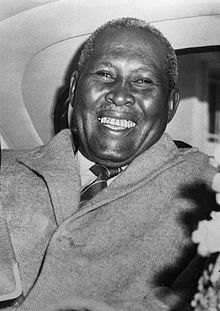A Death in Cape Town
From The Rainbow Nation (1996):
"1969 promised to be a big year for South Africa. Since the legalization of the African National Congress in 1963 and the formation of the Congress Coalition in 1964, the incumbent United Party was expected to be dethroned for the first time since 1933. Hopes were high, and, with the results tallied, the final verdict was in: an Coaltion victory.
SOUTH AFRICAN GENERAL ELECTION RESULTS, 25 APRIL 1969
OTHER PARTIES: 1/200 Seats. 0.5%
UNITED PARTY: 56/200 Seats. 28%
NATIONAL PARTY: 21/200 Seats. 10.5%
CONGRESS COALITION 122/200 Seats. 61%
Almost immediately, the results were disputed by MPs of the National Party and (to a lesser extent) the United Party, with riots breaking out in Pretoria and Cape Town. The infamous Pretoria race riots occurred on the 14th, with 2 being killed in a scuffle with police. Naturally, safety was of paramount concern and Albert Luthuli, Prime Minister-Designate, was escorted to Cape Town in an armored railway carriage. Luthuli was met by a jubilant crowd at Cape Town railway station, being cheered all the way to the National Assembly. After being sworn in, a stage was procured for Luthuli."
Excerpt from Luthuli's speech [1]:
"My fellow South Africans.
There is no place I would rather be more. The will of the people has spoken, and I stand here before you as living proof of that fact. Just yesterday, I pondered this with my darling wife Nokukhanya. She has done just as much for me and my campaign as I have myself, and look where we stand now. No greater feat could I have imagined for myself, and I am honored to be able to present myself today, here, as the Prime Minister of our great nation. It has been a great struggle for us to get here. Countless lives, from the last century to the present, have been lost in their persistence for liberation. But we have lived up to their dreams. We have secured our future. We shall endure! I bear no hatred for any man who stands here today. To those here in Cape Town, in Pretoria, in Durban, I approach you, not as an enemy, but as a friend. If South Africa is to thrive, we all must come together in peace. I would like to thank my darling wife Nokukhanya, for all she has done for me, and all she will do. We are indivisble! We are unconquerable!"
Raucous applause erupted from the crowd, and yet there was still a sense of unease. Luthuli had looked sickly, almost frail.
Several days later, the Prime Minister was involved in an accident, being hit by a goods train. He would never live to see his dream realized.
[1] I'm no speechwriter, so any feedback would be appreciated!
"1969 promised to be a big year for South Africa. Since the legalization of the African National Congress in 1963 and the formation of the Congress Coalition in 1964, the incumbent United Party was expected to be dethroned for the first time since 1933. Hopes were high, and, with the results tallied, the final verdict was in: an Coaltion victory.
SOUTH AFRICAN GENERAL ELECTION RESULTS, 25 APRIL 1969
OTHER PARTIES: 1/200 Seats. 0.5%
UNITED PARTY: 56/200 Seats. 28%
NATIONAL PARTY: 21/200 Seats. 10.5%
CONGRESS COALITION 122/200 Seats. 61%
Almost immediately, the results were disputed by MPs of the National Party and (to a lesser extent) the United Party, with riots breaking out in Pretoria and Cape Town. The infamous Pretoria race riots occurred on the 14th, with 2 being killed in a scuffle with police. Naturally, safety was of paramount concern and Albert Luthuli, Prime Minister-Designate, was escorted to Cape Town in an armored railway carriage. Luthuli was met by a jubilant crowd at Cape Town railway station, being cheered all the way to the National Assembly. After being sworn in, a stage was procured for Luthuli."
Excerpt from Luthuli's speech [1]:
"My fellow South Africans.
There is no place I would rather be more. The will of the people has spoken, and I stand here before you as living proof of that fact. Just yesterday, I pondered this with my darling wife Nokukhanya. She has done just as much for me and my campaign as I have myself, and look where we stand now. No greater feat could I have imagined for myself, and I am honored to be able to present myself today, here, as the Prime Minister of our great nation. It has been a great struggle for us to get here. Countless lives, from the last century to the present, have been lost in their persistence for liberation. But we have lived up to their dreams. We have secured our future. We shall endure! I bear no hatred for any man who stands here today. To those here in Cape Town, in Pretoria, in Durban, I approach you, not as an enemy, but as a friend. If South Africa is to thrive, we all must come together in peace. I would like to thank my darling wife Nokukhanya, for all she has done for me, and all she will do. We are indivisble! We are unconquerable!"
Raucous applause erupted from the crowd, and yet there was still a sense of unease. Luthuli had looked sickly, almost frail.
Several days later, the Prime Minister was involved in an accident, being hit by a goods train. He would never live to see his dream realized.
[1] I'm no speechwriter, so any feedback would be appreciated!
Last edited:

